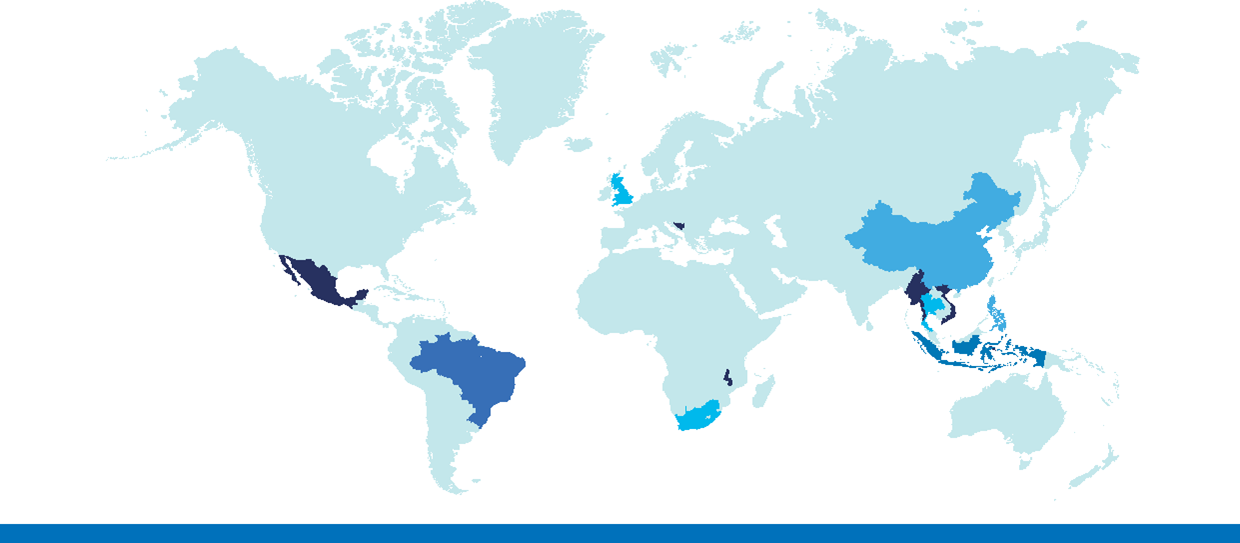The NHS Consortium for Global Health (NHSC) provides a point of access to expertise from the UK’s national health organisations, including the major National Health Service executive non-departmental public bodies. With oversight from the Department of Health & Social Care, we align with UK government strategy to foster effective peer-to-peer health partnerships with partner countries to strengthen health systems and advance health protection and health equity.
Background
The NHSC started in 2018 as a strategic partnership with the Foreign, Commonwealth and Development Office Better Health Programme, operating in eight countries in the Indo-Pacific, Latin America and Africa. The model has since grown and the NHSC has continued to expand its work with a range of global health partners.
The work of the NHSC encompasses the full spectrum of the UK health system, including service delivery, health workforce, health information systems, access to essential medicines, financing, and leadership and governance.
In all these areas, our role is to bring together the people who can innovate and improve health systems – working in partnership with governments and health organisations globally.

Our Approach
We provide coordinated access to a range of senior specialists across the NHS and UK health sector offering credible, evidence-informed, value-for-money advice, contributing to national, regional and global health policies, strategies and programmes.
We share global learning through identifying policy gaps and best practices among our network of partner countries and creating opportunities for sharing learning through cross-country learning exchanges. This includes sharing UK health sector expertise to strengthen health systems globally as well as seeking innovation from other countries back to the UK.
We build institutional health partnerships and networks through peer-to-peer, system-to-system dialogue to catalyse strategic partnerships that seek to strengthen health systems and reduce health inequalities.
We provide a secretariat function that manages the day-to-day functions of the NHSC, including logistical arrangements and financial flows between NHSC members. We support the ‘One HMG’ approach to ensure NHSC activities are aligned with HMG objectives, and to create efficiencies and cost-savings using existing government assets.

Additionally, the NHSC provides funders with a single point of access to NHSC organisations, reducing transaction costs for all parties; relieving them of requirements for multiple contracts, liaison points, and funding and reporting streams.
Technical Capabilities

Pandemic Response, Health Security, & Climate Change
The UK Health Security Agency can provide inputs to prevent and manage disease outbreaks and antimicrobial resistance, build resilience to humanitarian crises and climate change, and develop One Health approaches to building health system resilience. NHS England, through its Greener NHS programme can engage in national dialogue for net zero health services.

Workforce Planning & Development
NHS England ensures the workforce of today and tomorrow has the right numbers, skills, values and behaviours, therefore can provide strategic inputs for forecasting health worker requirements in primary and hospital care, commissioning workforce education, curriculum development, and integration of e-learning and technology enhanced learning models for staff education and continuous professional development. NHS England’s Leadership Academy can provide leadership training and coaching.

Health Financing & Strategic Purchasing
NHS England holds most of the national budget for health services and oversees provider payment mechanisms and contracting for primary care and hospitals, and health technologies such as drugs and devices. It can therefore provide important perspectives on sustainably financing and operationalising universal health coverage.

Digital Health & Transformation
NHS England can provide specialist technical expertise in health information system infrastructure, integration and interoperability, guidance on the national IT and data services ranging electronic health records in primary and secondary care; datasets and dashboards; mHealth; and eHealth. NHS England can provide inputs to develop a national vision for what a good digital health organisation should look like, how to protect it from cyber incidents, how it can be funded, and how to assist health and social care services reach digital maturity through the adoption of emerging technologies and innovations.

Public Health & Reduction of Health Inequalities
The Office for Health Improvement and Disparities and Public Health Wales can provide evidence-informed policy inputs for reducing the preventable burden of non-communicable diseases and of health inequalities, including through national disease surveillance and action on key risk factors including tobacco, obesity and harmful use of alcohol and drugs. The Office for National Statistics can share best practices through the international statistical system and provide capacity building inputs for National Statistical offices on statistical modernisation.

Health Technology Assessment, Research, Clinical Guidelines
& Quality Improvement
NICE can share their technical methods and governance processes of assessing health technologies and developing evidence-based guidance, quality standards and indicators, ensuring that universal health coverage is financially sustainable and of high quality, and creating a level playing field that incentivises life sciences innovation. The Care Quality Commission can share how it regulates public and private health and social care providers. NHS England oversees provider payment mechanisms that incentivise quality so can provide inputs on result-based financing, service user engagement, patient safety and service transformation. The Health Research Authority can share how it protects and promotes the interests of patients and the public in health and social care research.

Genomics in Healthcare
NHS England and the UK Health Security Agency can provide inputs on integrating genomic services, locally and nationally. NHS England can provide generic and specialty workforce curriculum development and training pathways for genomic service providers.

Government Relations
The NHSC implementation approach is primarily demand-driven with foreign government ministries as our key stakeholder and collaborating partners. Our relationships with UK government sector partners reach beyond health and enable us to facilitate strategic, technical and diplomatic dialogue between senior stakeholders. This includes UK government departments, such as the Foreign, Commonwealth & Development Office, Department for Business & Trade, and Department of Health & Social Care.

Monitoring, Evaluation & Learning
MEL is embedded across all phases of the NHSC’s work, ensuring accountability, transparency and learning in relation to achievements supported or delivered by the NHSC. The NHSC has a robust system linked to its current project management system which can be expanded to account for projects from multiple funding sources. The emphasis is on strong data collection which can translate into learning. The NHSC can also support partners in measuring programme outcomes and impact, including the provision of MEL technical inputs to logframe development, through end-of-programme evaluations and case studies.
NHS Consortium Members
- NHS England
- UK Health Security Agency
- Care Quality Commission
- NHS Resolution
- Public Health Wales
- National Institute for Health and Care Excellence
- Office for National Statistics
- NHS Health Research Authority
- Office for Health Improvement and Disparities
- Health Services Safety Investigations Body
NHS Consortium Structure

NHS Consortium Membership & Strategic Decision Making
NHSC Members include the major Executive Agencies, Non-Departmental Public Bodies and Non-Ministerial Departments, also known as Arm’s Length Bodies. The Members operate under a MOU that has the flexibility to engage new members and enter partnerships with a range of stakeholders. To deliver NHSC services in a sustainable manner, we operate on a not-for-profit, cost recovery basis. This enables the NHSC to develop working agreements with a range of partners and to generate income from a range of sources, including Official Development Assistance (ODA), non-ODA and commercial opportunities. The NHSC Steering Group meets quarterly and has senior representation from each Member organisation. The Steering Group provides strategic oversight and facilitates connectivity to senior NHS and cross-Government stakeholders.

NHS Consortium Secretariat
The Secretariat is jointly hosted by NHS England and the UK Health Security Agency. The Secretariat is an agile team with global health expertise, NHS systems understanding and partnership brokering capability. In addition to providing technical and strategic insights for programme design, planning, implementation and evaluation, it coordinates all stakeholder inputs and manages financial flows between NHSC Member organisations.

Consortium Technical Advisory Service (CTAS)
CTAS has evolved since 2018 and to date has accessed over 250 national-level subject matter specialists from across the NHSC membership, generating over 2,500 hours of expertise. Once a technical request is received from a country partner, the Secretariat team refines the ask and seeks out the relevant expertise in a responsive manner. Given the domestic responsibilities of these specialists, their respective organisations are remunerated for their time.

Contact
To find out more about working with the NHS Consortium for Global Health, contact: